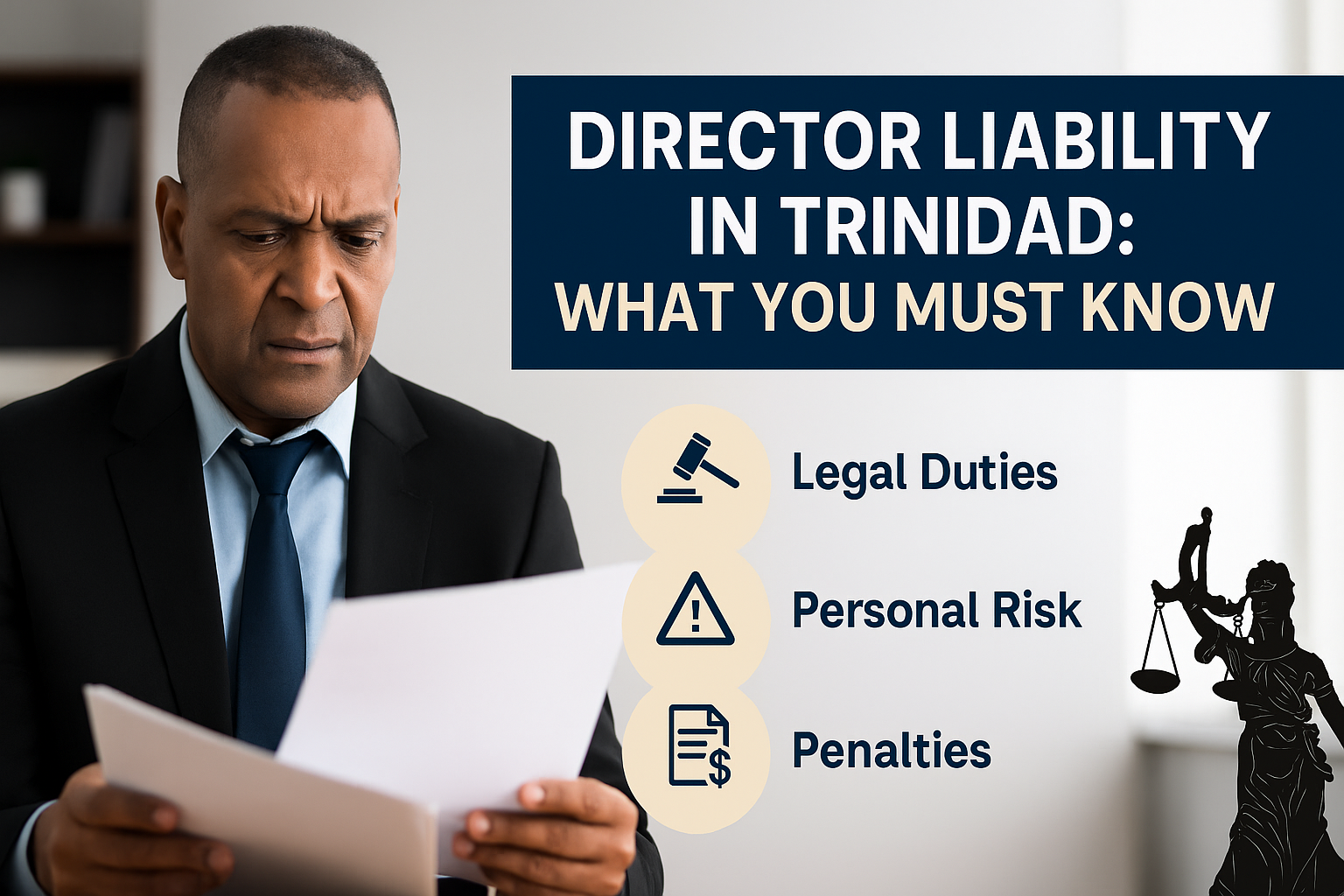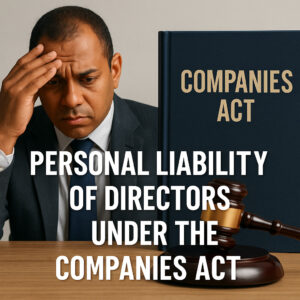
Limited Liability? Not Always. How Directors Can Still Be Personally Liable Under the Companies Act of Trinidad and Tobago
When we posted our last blog on “Struck Off & Still Operating”, we’ve had persons flooding our inbox with the question of ‘What about directors and limited liability?’ So hopefully this article can clear things up a bit.
Many business owners believe that once their company is registered as a limited liability, they’re automatically shielded from personal responsibility. But that belief could cost them everything, especially if they act outside the law.
Under the Companies Act, Chap. 81:01 of Trinidad and Tobago, directors can and do become personally liable under certain conditions. If your company is struck off, non-compliant, or you’re ignoring your statutory duties, you may be legally exposed and not even know it.
We tried our best to quote the legislation verbatim and here’s what the law actually says:
But wait…before we go further, here’s our disclaimer…
Disclaimer:
The information provided in this blog is for general informational purposes only and is not intended as legal advice. It does not create an attorney-client relationship and should not be relied upon as a substitute for professional legal counsel. If you require legal advice specific to your situation, please consult a qualified attorney.
When the Company is Struck Off, You’re No Longer Protected
According to Section 489(1) of the Companies Act, a company may be struck off the register by the Registrar if it fails to:
- File annual returns
- Pay prescribed fees
- Fulfill statutory obligations
Operating After Strike-Off (Section 489)
Once a company is struck off, it ceases to exist as a legal entity. Any individual, including a director who continues to:
- Operate the business,
- Enter into contracts,
- Issue invoices,
- Receive payments,
…is acting in a personal capacity or in fraud of third parties.
So, if a director continues to operate the business, they are doing so personally and illegally. Any contract entered into may be declared void, and any losses or damages may fall squarely on the director’s shoulders, not the company’s.
The limited liability protection vanishes the moment you act on behalf of a non-existent company.
Breach of Director Duties (Sections 99–101)
The Companies Act clearly states the fiduciary and statutory duties of directors. The Act outlines strict duties of care, diligence, and good faith for directors as shown below:
- Section 99(1): Directors must act honestly and in good faith in the best interests of the company.
- Section 99(2): They must exercise the care, diligence, and skill that a prudent person would in similar circumstances.
- Section 100: They must comply with the Companies Act, bylaws, and corporate resolutions.
If a director fails to:
- Act diligently,
- File required documents,
- Disclose material conflicts, or
- Uphold compliance obligations,
…they may be found personally liable for negligence or misconduct, especially where third parties suffer loss.
Fraud, Misrepresentation & Lifting the Veil
Although the company is a separate legal entity, courts can apply the principle of ‘lifting or piercing the corporate veil’ if:
- The company is used for fraudulent, dishonest, or illegal purposes
- The director conceals the true status of the business (such as pretending to be active when struck off)
- There is abuse of the corporate structure to evade legal responsibilities
This exposes directors to civil and possibly criminal proceedings.
If the court finds that the company is a façade or the director acted in bad faith, they may impose personal liability. This legal doctrine allows the court to treat the company’s liabilities as the director’s own.
Legal Risk: Reiterated plainly, courts may disregard the company’s limited liability status and hold the director personally liable because the company, by law, no longer exists. Such actions can constitute fraudulent misrepresentation or unauthorized dealings.
Note:
- (1) A company is guilty of an offence and is liable on summary conviction to a fine of ten thousand dollars if—
(a) the management of the company without reasonable cause fails to comply with section 143(1); or
(b) the company without reasonable cause contravenes section 155.
(2) When a company is guilty of an offence under this section, any director or officer of the company who knowingly authorised, acquiesced in or permitted the contravention is also guilty of an offence and liable on summary conviction to a fine of ten thousand dollars and to imprisonment for a term of six months.
- “Every person who is guilty of an offence under this Act or the Regulations is, if no punishment is elsewhere in this Act provided for that offence, liable on summary conviction to a fine of ten thousand dollars.”
If a company fails to file, submits false information, or breaches the law in any form, and a director knowingly allowed it to happen, that director may be criminally prosecuted alongside the company.
This includes:
- Failing to file annual returns
- Operating while struck off
- Providing false declarations to the Companies Registry
Banking, Contracts, and Public Procurement Risks
Operating a business while struck off can affect your:
- Business bank account (frozen, flagged or closed)
- Loan or grant applications (disqualified)
- Eligibility for public tenders (automatically ineligible)
If a director signs a lease or tenders a bid while the company is non-existent, that signature is personal. Not only can the contract be declared void, but the director may be sued personally for breach or even fraud.
Real-World Example: Business Still Operating After Strike-Off
If a company is struck off for failure to file annual returns (under Section 489(1)(a)) and a director continues to:
- Invoice clients,
- Apply for government contracts,
- Use the company’s name for banking or commercial purposes,
…then any liabilities incurred during this period may attach personally to the director. Banks, clients, and government agencies are legally entitled to take action against that individual, not the non-existent company.
Know Your Risk
Being a director of a limited liability company does not mean you’re untouchable.
If you:
- Operate after strike-off,
- Ignore filing obligations,
- Authorise illegal activity, or
- Fail to act with care and diligence,
…you can be personally liable under Trinidad and Tobago law.
In Summary, Under the Companies Act, Chap. 81:01:
- Directors have clear statutory duties (Sections 99–101)
- Acting on behalf of a struck off or dissolved company exposes directors to personal legal and financial consequences (Section 489)
- Directors can be personally liable for offences committed by the company (Section 513)
- Limited liability does not protect directors who act dishonestly, negligently, or illegally
Limited liability is a privilege, one that must be maintained through legal compliance and responsible governance.
So again, while one of the core features of a limited liability company (LLC) is that shareholders and directors are generally not personally liable for the debts of the company, this protection is not absolute. Under the Companies Act, Chap. 81:01 of Trinidad and Tobago, directors can face personal liability in specific circumstances, particularly where they breach their statutory duties, act unlawfully, or continue operating after the company is struck off.
If you’re unsure about your company’s status or obligations, act now. The cost of waiting may be your personal finances, legal record, and business reputation.
Need Help Getting Your Company in Order?
The Timely Entrepreneur Resource and Research Centre offers guidance through our Tax Compliance & Business Restoration Support services. Reach out if:
- You’ve been struck off
- You’re not sure what your compliance status is
- You need help filing or restoring your company
